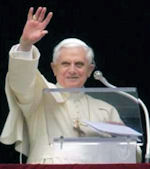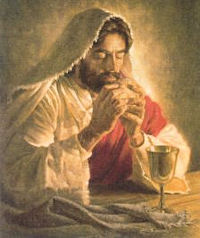Make your gift today!
Help keep Catholics around the world educated and informed.
Already donated? Log in to stop seeing these donation pop-ups.
» Enjoy our Liturgical Seasons series of e-books!
But they said to him, "Five loaves and two fish are all we have here." Then he said, "Bring them here to me," and He ordered the crowds to sit down on the grass. Taking the five loaves and the two fish, and looking up to heaven, He said the blessing, broke the loaves, and gave them to the disciples, who in turn gave them to the crowds. They all ate and were satisfied, and they picked up the fragments left over — twelve wicker baskets full. Those who ate were about five thousand men, not counting women and children (Matt 14:17-21).
Pope Benedict's Angelus Address
 This Sunday’s Gospel describes the miracle of the multiplication of the loaves that Jesus worked for a great throng of people who had followed him to listen to him and to be healed of various illnesses (cf. Mt 14:14).
This Sunday’s Gospel describes the miracle of the multiplication of the loaves that Jesus worked for a great throng of people who had followed him to listen to him and to be healed of various illnesses (cf. Mt 14:14).
As evening fell the disciples suggested to Jesus that he send the crowds away so that they might take some refreshment. But the Lord had something else in mind: “You give them something to eat” (Mt 14:16). However they had “only five loaves... and two fish”. Jesus’ subsequent action evokes the sacrament of the Eucharist: “He looked up to heaven, and blessed, and broke and gave the loaves to the disciples, and the disciples gave them to the crowds” (Mt 14:19).
The miracle consists in the brotherly sharing of a few loaves which, entrusted to the power of God, not only sufficed for everyone but enough was left over to fill 12 baskets. The Lord asked this of the disciples so that it would be they who distributed the bread to the multitude; in this way he taught and prepared them for their future apostolic mission: in fact, they were to bring to all the nourishment of the Word of life and of the sacraments.
In this miraculous sign the incarnation of God and the work of redemption are interwoven. Jesus, in fact, “went ashore” from the boat to meet the men and women (cf. Mt 14:14). St Maximus the Confessor said that the Word of God made himself present for our sake, by taking flesh, derived from us and conformed to us in all things save sin, in order to expose us to his teaching with words and examples suitable for us” (Ambigua 33: PG 91, 1285 C).
Here the Lord offers us an eloquent example of his compassion for people. We are reminded of all our brothers and sisters in the Horn of Africa who in these days are suffering the dramatic consequences of famine, exacerbated by war and by the lack of solid institutions. Christ is attentive to material needs but he wished to give more, because man always “hungers for more, he needs more” (Jesus of Nazareth, Doubleday, New York 2007, p. 267 (English translation). God’s love is present in the bread of Christ; in the encounter with him “we feed on the living God himself, so to speak, we truly eat the ‘bread from Heaven’” (ibid. p. 268).
Dear friends. “in the Eucharist Jesus also makes us witnesses of God’s compassion towards all our brothers and sisters. The Eucharistic mystery thus gives rise to a service of charity towards neighbor” (Post-Synodal Apostolic Exhortation Sacramentum Caritatis, n. 88). St Ignatius of Loyola, the founder of the Society of Jesus whom the Church is commemorating today, also bore witness to this. Indeed Ignatius chose to live “finding God in all things, loving him in all creatures” (cf. Constitutions of the Society of Jesus, III, 1, 26).
Let us entrust our prayers to the Virgin Mary, so that she may open our hearts to compassion for our neighbor and to fraternal sharing. – July 31, 2011
Sunday Readings
The first reading is taken from the Book of the Prophet Isaiah 55:1-3. The prophet, living among the Jewish exiles in Babylon, utters words of consolation for the despairing exiles. Here he tells them that Yahweh is inviting them to a banquet which he freely gives them. Yahweh alone can provide for their real needs; they are foolish to look elsewhere for consolation or help. If they cooperate he will fulfill the promise he had made to David, the promise of a future Messiah.
The second reading is from the Letter of St. Paul to the Romans 8:35, 37-39. St. Paul concludes this chapter with a hymn in praise of God's love for us: "with God on our side," he says, "who can be against us?" Then come today's verses, which are rhetorical questions, showing that there is no power in heaven or on earth that can take away or lessen God's love for us as manifested in Christ, his Incarnate Son.
The Gospel is from St. Matthew 14:13-21. This miracle was an act of kindness and loving thoughtfulness on the part of Christ. He saw the people's need - it was late for them to return to their homes and they had had nothing to eat all day - and He worked a miracle to provide for this need. The miracle also helped to convince the people of Galilee - the news spread around quickly - that He was the expected Messiah, but especially it prepared the way for the announcement of the greatest miracle of all - the miracle of the Eucharist. As St. John tells us Jesus referred to this miracle the next day in order to introduce His promise of the heavenly bread which He would give them and which was to be His own body and blood, under the form of bread and wine. The bread He miraculously multiplied that day to supply the bodily needs of the Galilean multitude was but a foreshadowing of that heavenly food which He was about to give as spiritual nourishment to the millions who would become His followers down through the centuries until the end of time.
The Galileans were grateful to Him for providing so kindly and so thoughtfully for their needs. How much more grateful should we not be for the miracle by means of which He has left us Himself to be our daily spiritual food? We are grateful, of course, to our loving Lord who not only handed up His Body to His enemies to be crucified for us, but through His divine power, arranged that His glorified body, triumphant over death, should remain with us, His Church, forever under the Eucharistic species.
Though invisible to mortal eyes, He is as truly present on our altars as He was that day in Galilee, when He miraculously fed the multitude. He is present under the form of bread and wine — so that we can partake of Him as spiritual nourishment during our earthly life. Could love go any further? He Himself said: "A man can have no greater love than to lay down his life for his friends" (Jn. 15 :13). Yes, once a man has given his life he has given his all; there is nothing more he can give. But Christ was more than man. He was God as well, and, therefore, He was able not only to lay down His human life for us, but was able and willing to remain with us after death under the Eucharistic species: to be our strength and nourishment until we join Him in the promised land of heaven.
When we compare our own unworthiness with this, almost incredible, love and thoughtfulness of Christ for us, all we can do is simply to say: "Lord, you know I am not worthy to receive you, but you say you want to come into my poor and untidy home, please make me less unworthy, forgive all my past sins and offenses, and give me the grace and strength to be better in the future."
Excerpted from The Sunday Readings by Fr. Kevin O'Sullivan, O.F.M.






